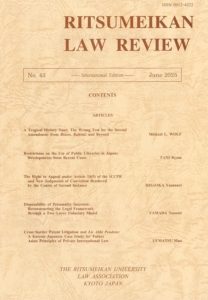Views
AI in Arbitration: Will the EU AI Act Stand in the Way of Enforcement?
This guest post was written by Ezzatollah Pabakhsh, Master’s Student at the University of Antwerp
The European Union has taken an unprecedented step by regulating artificial intelligence (AI) through the EU AI Act, which is the world’s first comprehensive legal framework for AI governance. According to Recital 61, Article 6(2) and Annex III, 8(a), AI tools used in legal or administrative decision-making processes—including alternative dispute resolution (ADR), when used similarly to courts and producing legal effects—are considered high risk. These tools must comply with the strict requirements outlined in Articles 8 through 27. Read more
Clearly Inappropriate Down Under: Isaacman v King [No 2] and the Outer Limits of Long-Arm Jurisdiction
By Dr Sarah McKibbin, University of Southern Queensland
The Supreme Court of New South Wales’ decision in Isaacman v King [No 2][1] is the kind of case that tempts one to say ‘nothing to see here’, and yet it richly rewards a closer look. On a conventional application of Voth v Manildra Flour Mills[2] — the leading Australian authority on forum non conveniens — Garling J stayed proceedings that attempted to litigate a New York relationship dispute in Sydney, being ‘well satisfied’ that the NSW Supreme Court was a clearly inappropriate forum.[3] The reasons, though brief by design,[4] illuminate the transaction costs of jurisdictional overreach,[5] show how the Voth framework handles an extreme set of facts, and offer a careful case study for empirical debates about Australian ‘parochialism’ in jurisdictional decision-making. Read more
Indonesian Constitutional Court on International Child Abduction
THE INDONESIAN CONSTITUTIONAL COURT DECISION REAFFIRMED PARENTAL CHILD ABDUCTION IS A CRIMINAL OFFENCE
By: Priskila Pratita Penasthika[1]
INTRODUCTION
The Indonesian Constitutional Court Decision Number 140/PUU-XXI/2023, issued on 3 September 2024, confirms that parental child abduction is a criminal offence under Article 330(1) of the Indonesian Criminal Code. Prior to this Decision, Article 330(1) of the Criminal Code was understood as a provision that could not criminalise someone for child abduction if the abduction was committed by one of the biological parents.
After 3 September 2024, through this Constitutional Court Decision, the abduction of a child by one of the biological parents, when the parent does not have custody based on a final court decision, is reaffirmed as a criminal offence. Read more
News
Virtual Workshop (in English) on September 2, 2025: Eva Lein on “PIL and dispute resolution in times of crisis”

On Tuesday, September 2, 2025, the Hamburg Max Planck Institute will host its monthly virtual workshop Current Research in Private International Law at 11:00 a.m. – 12:30 p.m. (CEST). Professor Eva Lein (Lausanne University) will speak, in English, about the topic
“PIL and dispute resolution in times of crisis”
In times of polycrisis, the law is put to the challenge. In international commercial transactions the question is how law can safeguard commercial activity, avoid a plethora of disputes, and encourage a pragmatic legal environment conducive to global economic recovery. This contribution discusses how dispute settlement mechanisms and private international law can be used to responsibly manage disputes in this context and to appropriately respond to future crises.
The presentation will be followed by open discussion. All are welcome. More information and sign-up here.
If you want to be invited to these events in the future, please write to veranstaltungen@mpipriv.de.
UEMATSU on Cross-border Patent Litigation and Lis Alibi Pendens: A Korean–Japanese Case Study for Future Asian Principles of Private International Law

The latest issue of the Ritsumeikan Law Review (No. 43, 2025), a law review in English published by the Ritsumeikan University Law Association since 1986, features a study by Professor Mao UEMATSU (School of Law, Ritsumeikan University) entitled Cross-border Patent Litigation and Lis Alibi Pendens: A Korean–Japanese Case Study for Future Asian Principles of Private International Law.
The article examines a series of patent litigation cases in Korea and Japan, analyzing them to “illustrate the complexity of cross-border patent litigation.” It further argues that, even after reforms to procedural laws in both Korea and Japan, structurally similar cross-border conflicts remain unresolved. The paper concludes with preliminary reflections on possible improvements in legal coordination within Asia.
By introducing case law from both jurisdictions and sharing information on recent legal developments in the region, the study provides valuable material for comparative research and contributes to a better understanding of the dynamics of Asian private international law.
The paper is freely available at the Ritsumeikan Law Review online version here.
Praxis des Internationalen Privat- und Verfahrensrechts (IPRax) 5/2025: Abstracts
The latest issue of the „Praxis des Internationalen Privat- und Verfahrensrechts“ (IPRax) features the following articles:


